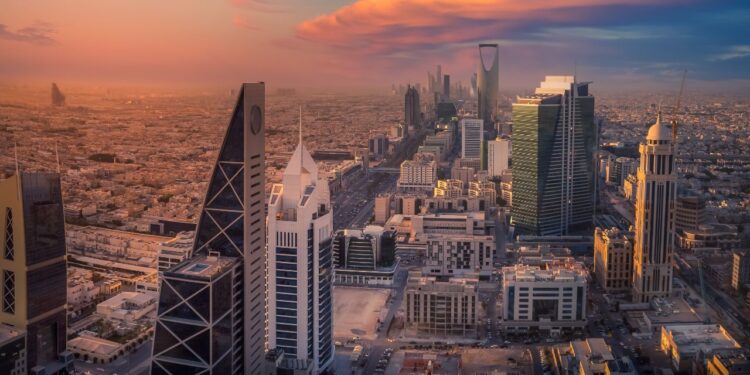- Two city-buildings called “The Line” and “Mukaab” are being built in Saudi Arabia.
- In the future, work/life within The Line and the Mukaab in Saudi Arabia will be a blend of innovation, sustainability, and advanced technology.
- Given the heavy emphasis on technology, it’s likely that many jobs within these two city-sized buildings will involve remote work, potentially even attracting digital nomads from around the world.
What if there was a city that was contained within a building, where you could both live and work without ever having to leave? Would it be remote work to the extreme, or a redefined permanent return to the office?
Whatever we might call it in the future of work, this arrangement may be a reality soon.
Two city-sized buildings called “The Line” and “Mukaab” are being built in Saudi Arabia; Linear city The Line is meant to accommodate 9 million people, be more than 100 miles long, and 1,650 feet high. The project says it will create 380,000 jobs by 2030.
On the other hand, the Mukaab, set to be the centerpiece of a new downtown in Riyadh, will be the world’s largest single-built structure with around 2 million square meters of interior floor space. This immersive, experiential destination is expected to offer a mix of residences, hotels, office spaces, and open-air parks and walkways. Work within the Mukaab will likely be diverse, catering to various sectors and industries.
In the future, work within The Line and the Mukaab in Saudi Arabia will be a blend of innovation, sustainability, and advanced technology.
The Line and the Mukaab are part of Saudi Arabia’s NEOM project. This is a planned cross-border city in the Tabuk Province of northwestern Saudi Arabia, which aims to incorporate smart city technologies and also function as a tourist destination.
These megastructures are part of the broader Saudi Arabia’s Vision 2030, an ambitious plan to diversify the economy, improve the quality of life for its citizens, and maintain its global standing.
“Saudi Vision 2030 is a strategic framework launched by Saudi Arabia, aimed at reducing the country’s dependence on oil, diversifying its economy, and developing public service sectors such as health, education, infrastructure, recreation, and tourism,” Ivo van Breukelen, Managing Partner of The Proptech Connection (US /Europe) told Allwork.Space. “The plan is built around three themes: a vibrant society, a thriving economy, and an ambitious nation. The objective is to have increased diversification economically, socially, and culturally.”
The design concept for The Line emphasizes pedestrian accessibility, with no real streets or cars, and everything residents need supposedly within a five-minute walk. All transportation and services would be underground, leaving 100% of the land above ground for nature.
The city’s design anticipates reduced infrastructure footprint and promises an ideal climate all year round, allowing residents to enjoy nature. Work in The Line will likely be centered around tech, research, education, and environmental sectors, attracting individuals drawn to these fields. The city is also designed to promote walkability, with everything easily reachable, eliminating the need for cars and reducing pollution.
Both The Line and the Mukaab are designed to foster a vibrant cultural scene, promote sports and recreational activities, and improve education and healthcare systems. These structures aim to provide a high quality of life, making them attractive places to live and work. With these developments, Saudi Arabia is positioning itself at the forefront of urban living and workspaces, promising a future where work is seamlessly integrated with sustainable living and advanced technology.
Given these designs, work within The Line and Mukaab will likely be heavily influenced by technology and sustainability principles. Here are some possible scenarios:
- Remote Work and Digital Nomadism: Given the heavy emphasis on technology, it’s likely that many jobs within these two city buildings will involve remote work, potentially even attracting digital nomads from around the world.
- Green Jobs: The focus on sustainability could lead to an increase in green jobs, such as those related to renewable energy, sustainable agriculture, and green construction.
- Technology and Innovation Jobs: Given the high-tech nature of these cities, there could be a surge in jobs related to technology, innovation, and research & development.
- Service and Tourism Jobs: Given the aim of these cities to become major tourist destinations, there will likely be many jobs in the service and tourism sectors.
- Community Services: Since all essential services are expected to be within a five-minute walk, jobs in community services such as healthcare, education, and local retail could also be prominent.
As for an update on the progress of The Line, van Breukelen told us “They have started with bulldozers and have started with the project. Several of our relationships are working on the project and NEOM has accelerated and is now focusing on delivery. The project is less design focused, and more developer/delivery led right now. All hands on!”















